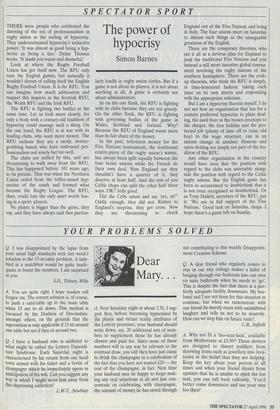SPECTATOR SPORT
THERE were people who celebrated the dawning of the era of professionalism in rugby union as the ending of hypocrisy. They underestimated hypocrisy's seductive power. 'It was almost as good being a hyp- ocrite as being a liar,' Dylan Thomas wrote. 'It made you warm and shameful.'
Look at where the Rugby Football Union has got itself now. The RFU only runs the English games, but naturally it wouldn't dream of calling itself the English Rugby Football Union. It is the RFU. You can imagine how much admiration and respect this inspires in the Scottish RFU, the Welsh RFU and the Irish RFU.
The RFU is fighting two battles at the same time. Let us look more closely, for only a body with a century-old tradition of hypocrisy could manage such a thing. On the one hand, the RFU is at war with its leading clubs, who want more money. The RFU reckons they are a seedy, money- grubbing bunch who have embraced pro- fessionalism not wisely but too well.
The clubs are miffed by this, and are threatening to walk away from the RFU. This has happened before: 101 years ago, to be precise. That was when the Northern Union ceded from the toffee-nosed hyp- ocrites of the south and formed what became the Rugby League. The RFU, then, could lose the only asset worth hav- ing in a sport: players.
No player is bigger than the game, they say, and they have always said that particu-
The power of hypocrisy
Simon Barnes
larly loudly in rugby union circles. But if a game is not about its players, it is not about anything at all. A game is certainly not about administrators.
So on the one flank, the RFU is fighting with its clubs because they are too greedy. On the other flank, the RFU is fighting with governing bodies of the game in Wales, Scotland and Ireland. Why? Because the RFU of England wants more than its fair share of the money.
In the past, television money for the Five Nations tournament, the traditional centre-piece of the rugby union's winter, has always been split equally between the four home unions while the French do their own deal. Now England say they shouldn't have a quarter of it, they deserve at least half. And the rest of you Celtic chaps can split the other half three ways. OK? Jolly good.
Did the Celts salute and say 'yes, sir?' Oddly enough, they did not. Rather to England's surprise, they got cross. Now they are threatening to chuck England out of the Five Nations and bring in Italy. The four unions meet on Saturday to discuss such things as the unarguable greatness of the English.
There are the conspiracy theorists, who see it all as a devious plan for England to junk the traditional Five Nations and join instead a still more lucrative global tourna- ment involving the rugby nations of the southern hemisphere. There are the cock- up theorists, who think the RFU is simply, in time-honoured fashion, taking each issue on its own merits and responding with the appropriate solecism.
But I am a hypocrisy theorist myself. I do not see how an organisation that has for a century preferred hypocrisy to plain deal- ing, the used fiver in the brown envelope to the cheque, the free holiday and the pro- tected job (plenty of time off to train, old boy) to the wage structure, can in an instant change its mindset. Honesty and open dealing are simply not part of the tra- dition of the RFU.
Any other organisation in the country would have seen that the position with regard to the clubs was untenable along- side the position with regard to the Celtic rugby unions. But the English game has been so accustomed to doublethink that it is not even recognised as doublethink. Or as Tony Hallett, secretary of the RFU, put it: 'We are in full support of the Five Nations.' Good luck on Saturday, chaps. I hope there's a game left on Sunday.


























































 Previous page
Previous page